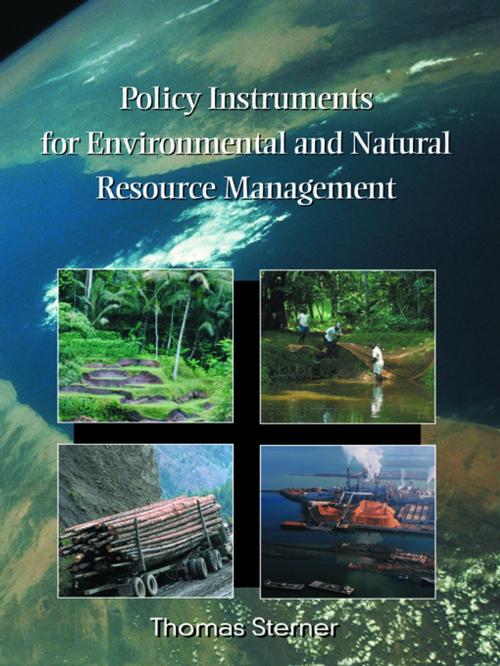Policy Instruments for Environmental and Natural Resource Management
Nonfiction, Science & Nature, Technology, Environmental, Nature, Environment, Ecology| Author: | Thomas Professor Sterner | ISBN: | 9781136522345 |
| Publisher: | Taylor and Francis | Publication: | September 30, 2010 |
| Imprint: | Routledge | Language: | English |
| Author: | Thomas Professor Sterner |
| ISBN: | 9781136522345 |
| Publisher: | Taylor and Francis |
| Publication: | September 30, 2010 |
| Imprint: | Routledge |
| Language: | English |
As Thomas Sterner points out, the economic 'toolkit' for dealing with environmental problems has become formidable. It includes taxes, charges, permits, deposit-refund systems, labeling, and other information disclosure mechanisms. Though not all these devices are widely used, empirical application has started within some sectors, and we are beginning to see the first systematic efforts at an advanced policy design that takes due account of market-based incentives. Sterner‘s book encourages more widespread and careful use of economic policy instruments. Intended primarily for application in developing and transitional countries, the book compares the accumulated experiences of the use of economic policy instruments in the U.S. and Europe, as well as in select rich and poor countries in Asia, Africa, and Latin America. Ambitious in scope, the book discusses the design of instruments that can be employed in a wide range of contexts, including transportation, industrial pollution, water pricing, waste, fisheries, forests, and agriculture. Policy Instruments for Environmental and Natural Resource Management is deeply rooted in economics but also informed by perspectives drawn from political, legal, ecological, and psychological research. Sterner notes that, in addition to meeting requirements for efficiency, the selection and design of policy instruments must satisfy criteria involving equity and political acceptability. He is careful to distinguish between the well-designed plans of policymakers and the resulting behavior of society. A copublication of Resources for the Future, the World Bank, and the Swedish International Development Cooperation Agency (Sida).
As Thomas Sterner points out, the economic 'toolkit' for dealing with environmental problems has become formidable. It includes taxes, charges, permits, deposit-refund systems, labeling, and other information disclosure mechanisms. Though not all these devices are widely used, empirical application has started within some sectors, and we are beginning to see the first systematic efforts at an advanced policy design that takes due account of market-based incentives. Sterner‘s book encourages more widespread and careful use of economic policy instruments. Intended primarily for application in developing and transitional countries, the book compares the accumulated experiences of the use of economic policy instruments in the U.S. and Europe, as well as in select rich and poor countries in Asia, Africa, and Latin America. Ambitious in scope, the book discusses the design of instruments that can be employed in a wide range of contexts, including transportation, industrial pollution, water pricing, waste, fisheries, forests, and agriculture. Policy Instruments for Environmental and Natural Resource Management is deeply rooted in economics but also informed by perspectives drawn from political, legal, ecological, and psychological research. Sterner notes that, in addition to meeting requirements for efficiency, the selection and design of policy instruments must satisfy criteria involving equity and political acceptability. He is careful to distinguish between the well-designed plans of policymakers and the resulting behavior of society. A copublication of Resources for the Future, the World Bank, and the Swedish International Development Cooperation Agency (Sida).















